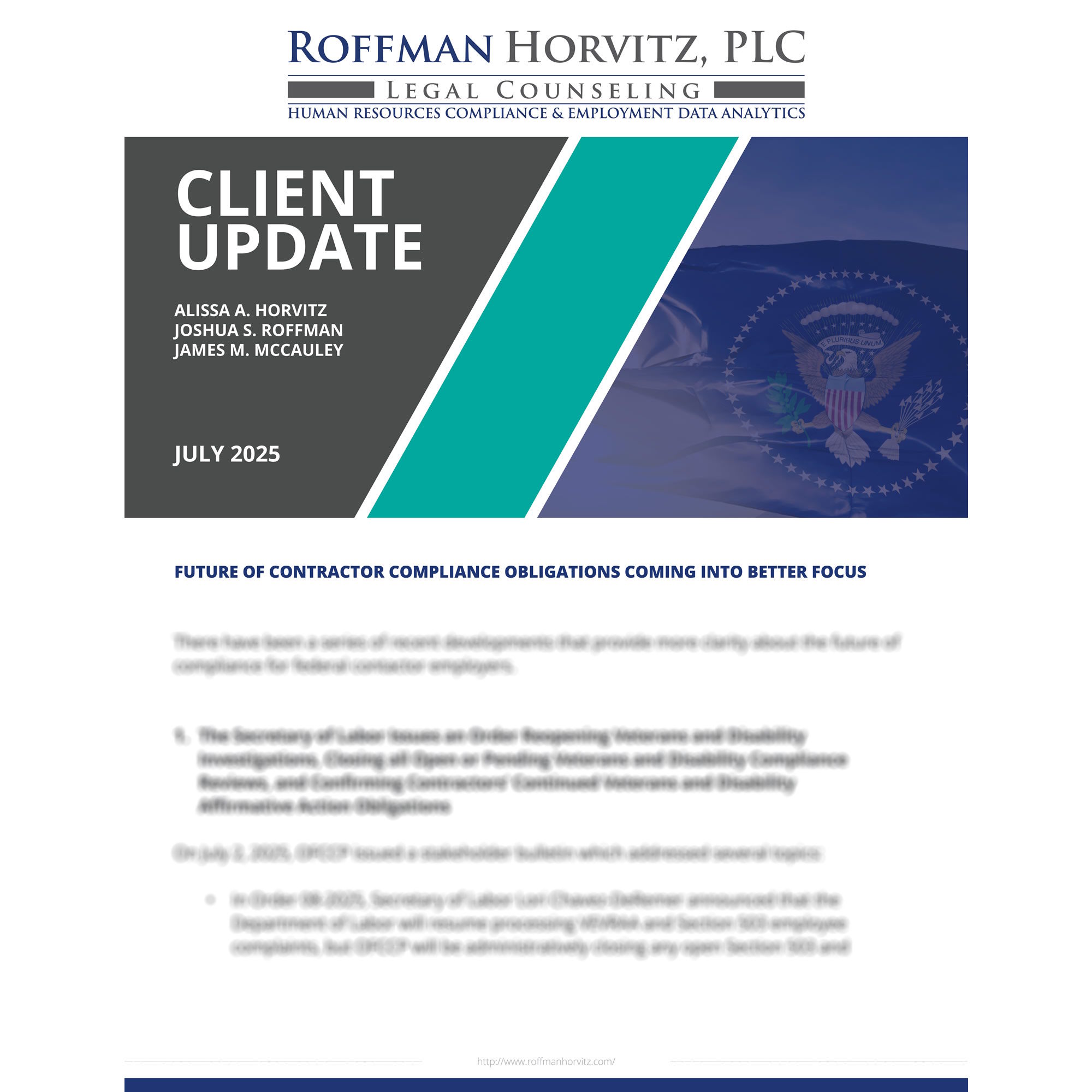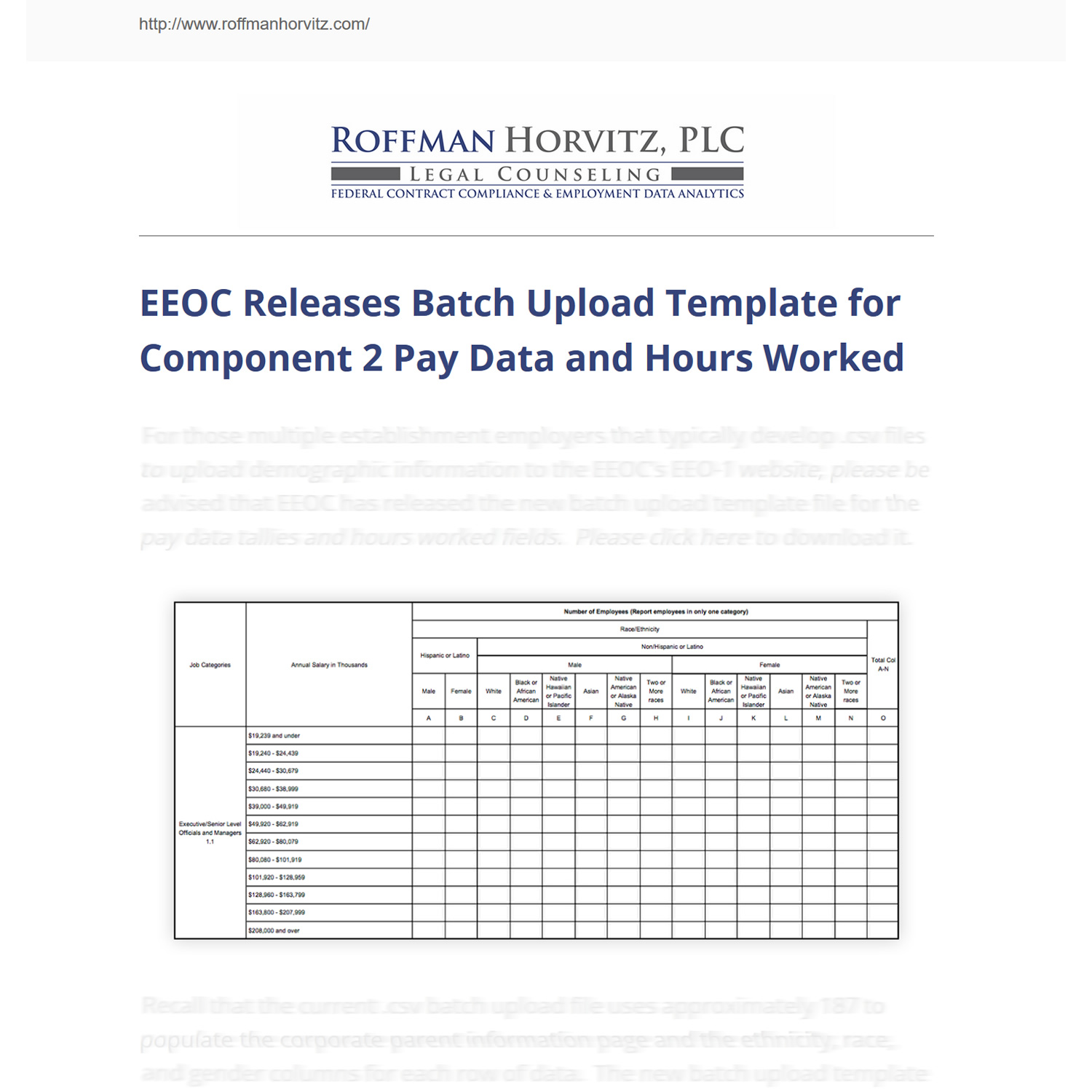As the Trump Administration OFCCP era comes to a conclusion, we wanted to summarize recent developments in our first Client Update of 2021.

As United States employers have adjusted to the workplace challenges related to the COVID-19 virus, there have been several important OFCCP and EEOC developments relevant to federal contractors and subcontractors.
This Client Update summarizes seven (7) noteworthy developments that have occurred since April 2020:
- The revised disability self-identification form
- The new construction contractor compliance check letters
- The re-approved establishment and functional AAP scheduling letter, the re-approved supply and service compliance check scheduling letter, the revised Focused Review Scheduling Letter for Section 503 disability reviews, and the newly-issued VEVRAA Focused Review Scheduling Letter
- EEOC's announcement that it will not collect 2019 EEO-1 race and gender counts until 2021
- OFCCP's Directive 2020-02: Efficiency in Compliance Evaluations
- OFCCP's Directive 2020-03: Pre-Referral Mediation Program
- OFCCP's Directive 2020-04: Ombuds Service Supplement
Roffman Horvitz will be holding two complimentary web seminars on June 24 and June 25 to discuss these developments to afford clients and friends of the firm an opportunity to hear our perspectives on these new developments and submit questions about these new directives through the Q&A feature of the web seminar application.
1. Revised Disability Self-Identification Form
The Office of Management and Budget (OMB) granted OFCCP approval for a revised disability self-identification collection form required by Section 503 of the Rehabilitation Act of 1973. The form can be found on the OFCCP's website here: https://www.dol.gov/agencies/ofccp/self-id-forms. The revised form contains several changes from the previous form including
- spaces for name and date at the top,
- additional examples and alphabetic organization of disabilities,
- removal of reasonable accommodation language, and
- reduction in length to one page.
These changes should help employees and applicants better understand the breadth of disability status that go well beyond those that require workplace accommodations. The revised form combined with strategic employer messaging on disability self-identification should help increase employee/applicant self-identification participation rates, which have tended to be low.
This form also incorporates a few changes in response to comments including a space for employee ID under the name and a space that employers may edit to request additional information to aid in recordkeeping.
Employers are permitted to incorporate the revised form into electronic applicant tracking systems or self-service employee portals but must abide by the OFCCP's rigid formatting requirements.
All contractors covered by Section 503 must offer applicants and new hires the opportunity to self-identify as an individual with a disability, and contractors must use the required form at least every 5 years after the first year of coverage under the act to re-survey all employees. The OFCCP expects that contractors will implement use of the revised form for all collections of disability self-identification from applicants and employees by August 4, 2020.
2. Construction Contractor Compliance Checks
On April 7, 2020 OFCCP received approval for two new compliance check scheduling letters for construction contractors. One version of the compliance check letter is for direct federal construction contractors, and the other version of the letter is for federally-assisted construction contractors. Direct federal contractors have compliance obligations for individuals with disabilities pursuant to Section 503 of the Rehabilitation Act of 1973, and they have protected veteran compliance obligations pursuant to the Vietnam Era Veterans Readjustment Assistance Act, as amended. Federally-assisted contractors do not have veteran or disability compliance obligations. OFCCP intends to schedule a portion of construction contractors for the newly-approved compliance checks, which are more streamlined than a full compliance review.
Both versions of the scheduling letters request examples of personnel and payroll records from projects in the county selected (or county equivalent), examples of job postings, and examples of accommodation requests. The federally-assisted contractor letter requests only accommodations related to pregnancy, childbirth, related medical conditions, or religious observances and practices. The direct federal contractor letter requests broader accommodation requests as well as copies of current Section 503 and VEVRAA AAPs.
The OFCCP has committed to posting online the methodology it will use to schedule construction contractors for compliance checks, but the methodology has not yet been published at this time.
3. Supply and Service Scheduling Letters
In April 2020, the Office of Management and Budget (OMB) approved four audit scheduling letters for supply and service contractors.
- OMB approved revised audit scheduling letters for
- compliance reviews of establishment plans, functional plans, and corporate management compliance evaluations, and
- Section 503 focused reviews; - It renewed the compliance check letter; and
- It approved a new VEVRAA focused review letter that parallels the Section 503 letter.
The revised compliance review scheduling letter is similar to the prior version, with a few small changes:
- Paragraph 21 of the previous letter required the date the most recent assessment of personnel processes was performed and the date of the next scheduled assessment. The updated letter no longer requires these dates but instead requires a "description of the assessment."
- Paragraph 22 of the previous letter required the date the most recent assessment of physical and mental qualifications was performed and the date of the next scheduled assessment. The updated letter no longer requires these dates but instead requires the "schedule of the assessment."
- Paragraph 18 of the previous letter may have had a typo in it. if a contractor was six months or more into its current AAP year when it received the audit letter, it had to supply only the hire, applicant, and promotion activity for at least the first six months of the current AAP year because the letter cited only sub-paragraphs (a) through (c). When a contractor receives its audit letter in the latter half of its AAP cycle, the updated letter now asks for the termination activity for the current AAP year in addition to the hire, applicant, and promotion activity because the letter now cites to sub-paragraphs (a) through (d).
The supply and service compliance check scheduling letter is essentially identical to the prior compliance check letter.
The revised Section 503 focused review scheduling letter requires submission of fewer pieces of information than the prior Section 503 scheduling letter. Specifically, the following information requests were removed:
- The formation of job groups (covering all jobs) consistent with criteria given in 41 CFR § 60-2.12;
- Documentation of all actions taken to comply with the audit and reporting system requirements described in 41 CFR § 60-741.44(h)
- Copies of your Employer Information Report EEO-1 (Standard Form 100 Rev.) for the last three years
- The dates of performance of the most recent assessments of personnel processes and physical & mental qualifications
- The dates of the next scheduled assessments of personnel processes and physical & mental qualifications
The Section 503 letter also requires that if any of the requested information is maintained electronically, it must be submitted in an electronic format that is "complete, readable, and useable," including indices explaining any acronyms or codes.
The new VEVRAA focused review scheduling letter is virtually identical to the updated Section 503 scheduling letter but it refers to VEVRAA requirements and the veteran hiring benchmark instead of Section 503 requirements and the disability utilization analysis.
4. EEO-1 Collection Delayed Until 2021
The EEOC announced that collection of the 2019 EEO-1 Component 1 employer demographic information surveys will be delayed until 2021 due to the COVID-19 pandemic. The EEOC will collect both 2019 and 2020 EEO-1 Component 1 surveys at that time. The survey is required from employers covered by Title VII with over 100 employees, owned or affiliated with other companies in an entity with over 100 employees, or holding Federal prime or first tier contracts over $50,000 with 50 or more employees. OMB approval of the collection under the Paperwork Reduction Act is currently pending, but the EEOC expects that the collection period will begin in March of next year. The EEOC press release concerning the delayed collection can be found here: https://www.eeoc.gov/newsroom/eeoc-delays-eeo-data-collections-due-covid-19-public-health-emergency
We encourage clients to capture now the data they will use to file 2019's data later, rather than having to research, resurrect, or restore data regarding 2019 in 2021.
5. Directive 2020-02: Efficiency in Compliance Evaluations
The contractor community has complained in the past about how long some compliance reviews have taken, and this new directive responds to those concerns. The background section of this directive explains OFCCP's motivation in issuing the directive:
Shortening the duration of compliance evaluations is a significant objective in the fiscal year (FY) 2020 OFCCP Operating Plan. OFCCP has taken multiple actions to ensure that aged-case reduction is a priority for the agency. Aged cases are defined as compliance evaluations that have not resulted in an administrative closure, conciliation agreement, or referral to the Office of the Solicitor within two years of the date of the scheduling letter. Timely completion of compliance evaluations and quick remediation of violations are beneficial to employees, applicants, and contractors. Efficient compliance evaluations also help ensure that relevant evidence is collected in as timely a manner as possible (and in the case of witness testimony, is not lost due to witness unavailability or fading memories). Therefore, thorough compliance evaluations completed in an expeditious manner benefit the regulated community, OFCCP, and most importantly, the workers that OFCCP is tasked to protect.
In this Directive, OFCCP committed to the following:
- The Agency's Case Management System (CMS) will send reminders to compliance officers to contact contractors every 30 days to provide a status update
- The CMS alerts the Regional Director, the Director of Program Operations, and the Director of Enforcement when a compliance evaluation is still open for 12 months without issuance of a Pre-Determination Notice, and at 6-month intervals thereafter.
The contractor can request that OFCCP conduct a review of an open compliance evaluation when the evaluation is open for one year from the day the contractor received the scheduling letter, without the issuance of a Predetermination Notice (PDN), or the compliance evaluation remains open for two years and has not been referred to the Solicitor for enforcement, by sending a petition request to the Director of OFCCP with a copy to the Ombudsman. As a prerequisite, the issue should have been raised with the Regional Director.
6. Directive 2020-03: Mediation
In Directive 2020-03, OFCCP established a mediation program to resolve findings of discrimination prior to referrals to the Solicitor of Labor for enforcement.
When OFCCP finds discrimination during a compliance review and issues a Pre-Determination Notice advising the employer of these findings, the contractor then has an opportunity to rebut the PDN findings. If the OFCCP does not rescind its discrimination findings based on the contractor's response, it issues a Notice of Violations. At that point, the contractor has two procedural choices: (1) resolve the discrimination findings by conciliating with OFCCP to reach agreement, including a monetary remedy for the alleged victims of discrimination, or (2) refuse to conciliate and negotiate, at which point the OFCCP will issue a Show Cause Notice (SCN). The government contractor has 30 days following the issuance of the SCN to refute OFCCP's findings. If the contractor is not successful in refuting the OFCCP's findings and still is unwilling to reach agreement with OFCCP, the OFCCP can refer the matter to the Solicitor of Labor for enforcement proceedings.
Historically, once OFCCP has reached a conclusion about the data, it has been nearly impossible to persuade OFCCP to evaluate objectively and fairly the employer's evidence of legitimate, nondiscriminatory reasons, and there was no pre-litigation dispute resolution process that contractors could turn to before the OFCCP would file its complaint.
Directive 2020-03 outlines the new mediation program, which affords contractors the possibility of seeking neutral assistance to resolve discrimination matters prior to their being referred to the Solicitor's office for referral. The parties may select a mediator from certain sources: (1) the Federal Mediation and Conciliation Service roster or from other qualified federally approved mediators; (2) the OFCCP Ombudsman; and (3) any qualified individual proposed by the government contractor. If the parties cannot agree on pre-mediation procedures, the OFCCP retains the discretion to refer the matter to its Solicitor's office without first attempting mediation.
Based on OFCCP's directive, it seems that mediation is a process that will be saved for the next-to-last stage of the compliance review, although OFCCP has reserved the right to suggest mediation at earlier stages. "OFCCP believes mediation is most useful after attempts to conciliate following the issuance of a SCN citing violations of discrimination, but prior to referral for enforcement, were unsuccessful." Once a mediator is chosen, OFCCP envisions that the parties will convene and attempt mediation as soon as practicable and ideally within 30 days of the selection of the mediator. Mediation is confidential, but both parties will retain the right to refer to the mediation process as good faith evidence of conciliation.
7. Directive 2020-04: The Ombuds Program
Unlike mediation, use of the Ombuds Program is not reserved for the later stages of a compliance review nor only for matters involving discrimination. The Ombudsman is available to assist contractors for myriad reasons throughout the course of compliance evaluations, as explained in the Ombuds Protocol: https://www.dol.gov/sites/dolgov/files/OFCCP/OMBUDS/OFCCP_Ombuds_508_rev.pdf
One of the most important goals of the Ombuds service, from our perspective, is to "create a climate in which contractors feel comfortable contacting the Ombuds Service while dispelling the notion that raising issues or concerns with OFCCP will adversely impact contractors in the future." The protocol also sets forth the standards of Confidentiality, Neutrality, Independence, and Informality that the Ombudsman will observe, and it contains important representations that should serve to reassure contractors that using the new service will not have negative consequences in pending or future audits.
During audits, government contractors still are well advised to contact their in-house or outside lawyers for advice before contacting the Ombudsman and to try to resolve issues through the OFCCP chain of command (compliance officer, assistant district director, district director, and regional director) before contacting the Ombudsman. But, if the compliance officer is not adhering to the regulations, or the contractor is getting conflicting interpretations of the same regulation or sub-regulatory guidance, the Ombudsman may prove to be a helpful resource.
There are three ways to contact the Ombudsman:
- By phone: (202) 693-1174
- By email: Stergio.Marcus@dol.gov
- Using the Ombuds Service Referral Form: https://ofccptraining.dol.gov/ofccp/ombuds-entry
Download zip file of all scheduling letters
Related Documents
- Voluntary Self‐Identification of Disability Form
- Omsbud Program
- Federal Contract Compliance Manual (FCCM)

